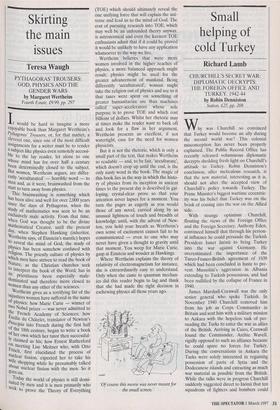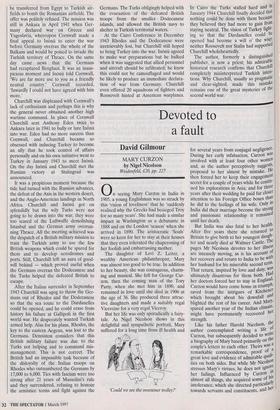Small helping of cold Turkey
Richard Lamb
CHURCHILL'S SECRET WAR: DIPLOMATIC DECRYPTS: THE FOREIGN OFFICE AND TURKEY, 1942-44 by Robin Denniston Sutton, £25, pp. 208 Why was Churchill so convinced that Turkey would become an ally during the second world war? This colossal misconception has never been properly explained. The Public Record Office has recently released voluminous diplomatic decrypts shedding fresh light on Churchill's attitude to Turkey. Robin Denniston's conclusion, after meticulous research, ii that the new material, interesting as it is, should not alter the accepted view of Churchill's policy towards Turkey. The Prime Minister's biggest wartime eccentric- ity was his belief that'Turkey was on the brink of coming into the war on the Allied side.
With strange optimism Churchill, flouting the views of the Foreign Office and the Foreign Secretary, Anthony Eden, convinced himself that through his person- al influence he could persuade the Turkish President Ismet Inonii to bring Turkey into the war against Germany. He overestimated the importance of the Turco-Franco-British agreement of 1939 which had been concluded in haste to pre- vent Mussolini's aggression in Albania extending to Turkish possessions, and had been nullified by the collapse of France in 1940.
James Marshall-Cornwall was the only senior general who spoke Turkish. In November 1940 Churchill removed him from his job as Corps Commander in Britain and sent him with a military mission to Ankara with the hopeless task of per- suading the Turks to enter the war as allies of the British. Arriving in Cairo, Cornwall found the Commander, Archie Wavell, rigidly opposed to such an alliance because he could spare no forces for Turkey. During the conversations in Ankara the Turks were solely interested in regaining possession of parts of Syria and the Dodecanese islands and extracting as much war material as possible from the British. While the talks were in progress Churchill suddenly suggested direct to InOnii that ten squadrons of fighters and bombers could be transferred from Egypt to Turkish air- fields to bomb the Romanian airfields. The offer was politely refused. The mission was still in Ankara in April 1941 when Ger- many declared war on Greece and Yugoslavia, whereupon Cornwall made a final appeal to InConti to enter the war before Germany overran the whole of the Balkans and would be poised to invade the Turkish territory of Thrace. On the same day came news that the Germans had recaptured Benghazi. It was an inaus- picious moment and InOnii told Cornwall, `We are far more use to you as a friendly neutral country.' Cornwall recorded, `Inwardly I could not have agreed with him more.'
Churchill was displeased with Cornwall's lack of enthusiasm and perhaps this is why the general never obtained another high wartime command. In place of Cornwall Churchill sent Anthony Eden twice to Ankara later in 1941 to bully or lure Inonii into war. Eden had no more success than Cornwall, and Churchill became so obsessed with inducing Turkey to become an ally that he took control of affairs personally and on his own initiative went to Turkey in January 1943 to meet Monti. On the day 'mina and Churchill met the Russian victory at Stalingrad was announced.
It was a propitious moment because the tide had turned with the Russian advances, the defeat of the Axis in the western desert, and the Anglo-American landings in North Africa. Churchill and Intinii got on splendidly but the wily Turks were not going to be drawn into the war; they were too scared of the Luftwaffe demolishing Istanbul and the German army overrun- ning Thrace. All the meeting achieved was the despatch of a British military mission to train the Turkish army to use the few British weapons which could be spared for them and to develop aerodromes and ports. Still, Churchill left an aura of good- will behind — which proved useful when the Germans overran the Dodecanese and the Turks helped the defeated British to escape.
After the Italian surrender in September 1943 Churchill was agog to throw the Ger- mans out of Rhodes and the Dodecanese so that the sea route to the Dardanelles could be opened, and he could erase from history his failure at Gallipoli in the first world war. He desperately wanted Turkish armed help. Alas for his plans, Rhodes, the key to the eastern Aegean, was lost to the Germans. Denniston considers that this British military failure was due to the Turks not helping and to command mis- management. This is not correct. The British had an impossible task because of the disloyalty of the Italian troops on Rhodes who outnumbered the Germans by 17,000 to 6,000. Ties with fascism were too strong after 21 years of Mussolini's rule and they surrendered, refusing to honour the armistice terms and fight against the Germans. The Turks obligingly helped with the evacuation of the defeated British troops from the smaller Dodecanese islands, and allowed the British navy to shelter in Turkish territorial waters.
At the Cairo Conference in December 1943 Rhodes and the Dodecanese were irretrievably lost, but Churchill still hoped to bring Turkey into the war. InOnii agreed to make war preparations but he balked when it was suggested that allied personnel and aircraft should be infiltrated; he knew this could not be camouflaged and would be likely to produce an immediate declara- tion of war from Germany. Churchill even offered 20 squadrons of fighters and Roosevelt hinted at American warplanes. In Cairo the Turks stalled hard and in January 1944 Churchill finally decided that nothing could be done with them because they believed they had more to gain from staying neutral. The vision of Turkey fight- ing so that the Dardanelles could be opened had become a will o' the wisPi neither Roosevelt nor Stalin had supported Churchill wholeheartedly. The author, formerly a distinguished publisher, is now a priest; his admirable historical research confirms that Churchill completely misinterpreted Turkish inten- tions. Why Churchill, usually so pragmatic and clear-sighted, made this mistake remains one of the great mysteries of the second world war.



























































 Previous page
Previous page